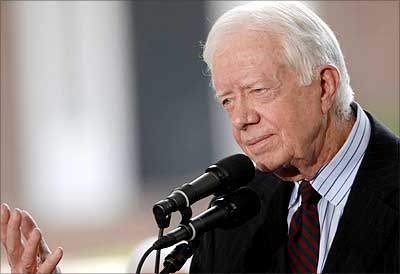|
|
| Help | |
| You are here: Rediff Home » India » News » First Look |
|
 Is the Indo-US nuclear deal a 'recipe for disaster'?
Is the Indo-US nuclear deal a 'recipe for disaster'?
Former US President Jimmy Carter doesn't say so -- at least, not directly. But in a signed column, the founder of the non-profit Carter Center suggests that it could well act as a catalyst for disaster.
Carter is the first US president, current or former, to express reservations about the deal, and his argument is constructed in three stages. One, the US has been abandoning many of the nuclear arms agreements that have been negotiated over the past 50 years, the deal with India being just one of them.
Two, these actions have sent mixed signals to the likes of North Korea, Iran and other nations that have the know-how to produce nuclear weapons.
There, while opening the door for the entry of more nations into the nuclear club, the US and the rest of the nuclear world has done nothing to reduce the global arsenal of approximately 30,000 nuclear weapons now in the hands of the US, Russia [Images], China, France [Images], Britain, Israel, India, Pakistan and possibly North Korea.
'A global disaster is just as possible now, through mistakes or misjudgments, as it was during the depths of the cold war,' Carter warns, in an article that appears on Project Syndicate, an international association of newspapers that seeks to bring together on one platform the best and/or most influential thinkers of our age.
Carter points out that the 1970 Non-Proliferation Treaty is the cornerstone of all the restraining agreements that control nuclear proliferation -- and 'during the last five-year review conference at the United Nations in 2005, only Israel, India, Pakistan and North Korea were not participating -- the first three have nuclear arsenals that are advanced, and the fourth's is embryonic.'
Carter says India's nuclear ambitions have been common knowledge since 1974, and that he and other American presidents had consistently imposed the policy of not selling nuclear technology or fuel to India or indeed to any country that had not signed the NPT.
'Today these restraints are in the process of being abandoned,' Carter says.
He agrees that India's political leadership is capable of handling the nuclear arsenal as responsibly as the leaders of the original five nuclear nations -- but that, he says, is not the point.
'But there is a significant difference: the original five have signed the NPT and have stopped producing fissile material for weapons.
'India's leaders should make the same pledges and should also join other nuclear powers in signing the Comprehensive Nuclear Test Ban Treaty. Instead, they have rejected these steps and insist on unrestricted access to international assistance in producing enough fissile material for as many as 50 weapons a year. If India's demand is acceptable, why should other technologically advanced NPT signatories, such as Brazil [Images], Egypt, Saudi Arabia and Japan [Images] -- to say nothing of less responsible nations -- continue to restrain themselves?'
Carter argues that the 45-nation Nuclear Suppliers Group, and the International Atomic Energy Agency, should now work not to prevent India's development of nuclear power, but to ensure that India signs the NPT as the other official nuclear nations have.
Text: The Rediff News Bureau | Photograph: AFP/Getty Images
|
|
| © 2007 Rediff.com India Limited. All Rights Reserved. Disclaimer | Feedback |